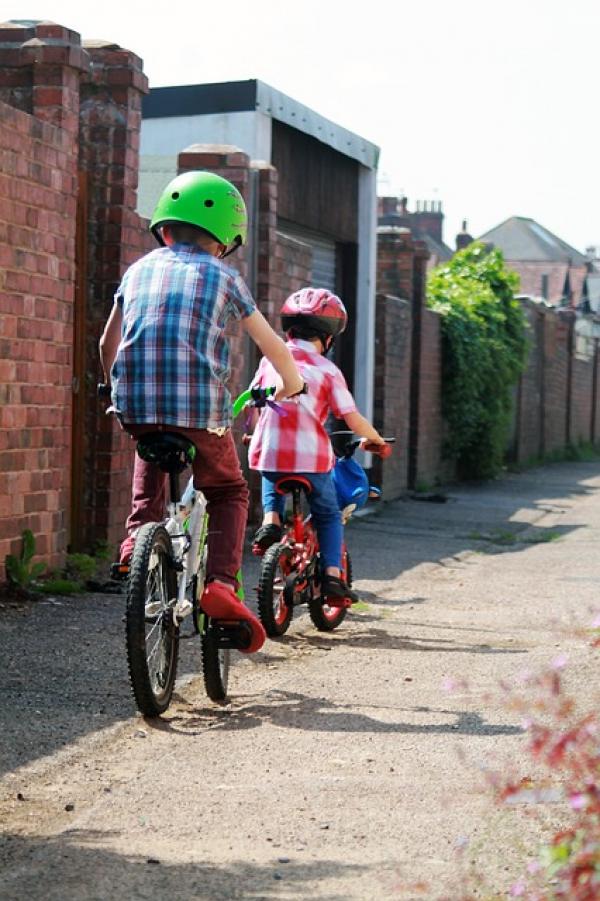Getting children exercising doesn't always have to involve structured activities like sports. There's lots of other ways they can incorporate more exercise into their days.

Did you know...
Regular exercise can help improve:
- Concentration
- Learning skills
- Self-esteem
As a parent, carer or teacher, you can help your children or pupils enjoy exercise and being active in many ways.
60 active minutes
Only one in five parents know how much time children need to spend exercising per day. Children should aim to be physically active at a moderate intensity for one hour every day. Their heart rate should increase, but conversation should still be possible. It’s ok to break activity into easier 15-minute slots throughout the day.
School days
There are plenty of ways kids can get active during the school day:
- Walking to and from school
- Making the walk fun by telling stories and playing games, like I-spy or car spotting
- Giving your child a sense of achievement by giving them a pedometer or activity tracker to measure the number of steps they take
- Showing them how to play games like hopscotch, skipping and tag.
Physio tip
- Wearing the right clothing and footwear during exercise is very important and can help your child avoid injury
- Sensible trainers are a must, as is clothing that gives them the freedom to bend, stretch and jump
- Children should spend a few minutes warming up and cooling down with some light activity to help their body get used to starting or stopping exercise.
Up and about
Get kids active after school, at weekends and during holidays. Here are a few tips to help you get the kids away from their screens.
- Get a map of your area and plan a weekly walk

- Teach your child to ride a bike so you can cycle together
- Go for a swim together
- Don’t just use the park for a picnic, do something active too. Throw a frisbee, fly a kite, or kick a ball around
- Enter your family in an event like a fun-run or bike ride
- If your child shows an interest in watching sport on TV then see if you can sign them up to a local club where they can try it
- Walk to the shops, or park further away if you have to drive
- Take the stairs, rather than the lift or escalator, and ask for a little help with the shopping bags!
- When the weather puts a dampener on things, get active indoors
- Play hide and seek or show your child how to use a hula hoop.
Good posture
Children generally start off life with good posture. But over the years, bad habits can creep in, leaving children more vulnerable to back pain in later life.
For better posture
- Encourage children to stand like a soldier, or a ballerina, with head up, shoulders back and tummy in
- ‘One size fits all’ classroom furniture is not always ideal, but children can sit well by bringing their chair close to the table, sitting back in the seat with their back upright. They should avoid hunching over textbooks and be given the opportunity to move about during long lessons
- Sturdy rucksacks are safer than ‘fashion’ bags. They should be packed and worn correctly. Heavier objects should be packed first and the bag should be worn properly using both shoulder straps and the waist belt.
Physio tip
Bad habits are hard to break. The earlier children begin to enjoy regular physical activity and healthy food, the more likely they are to stick with good habits as they grow up!
A helping hand at home
Explain to your child that you’ll have more ‘fun’ time together if they help you out with chores. Teach your child how to make their bed and challenge them to do it more quickly every day.
You can also put music on as you get ready for school or work and dance around together. Music can help get you in a good frame of mind for the day ahead!
If you have a garden, give your child their own area or a couple of flower pots to look after. Keep your child motivated by praising them for being active.
If their confidence has been knocked by a difficult activity or sport, remind them that it’s the taking part that is important and ask them about other forms of exercise they’d like to try out.
Download our Fit for the Future leaflets, produced by the CSP and the British Dietetic Association. There are five different version of Fit for the Future, and each ties in with local health and wellbeing initiatives.